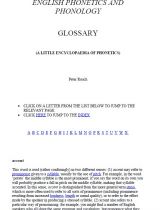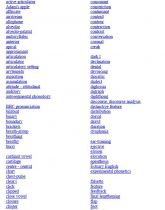Skripta: English phonetics and phonology glossary (A little encyclopaedia of phonetics) Peter Roach
Skrýt detaily | Oblíbený- Kvalita:84,6 %
- Typ:Skripta
- Univerzita:Univerzita Jana Evangelisty Purkyně v Ústí nad Labem
- Fakulta:Filozofická fakulta
- Kategorie:Jazyky
- Podkategorie:Angličtina
- Předmět:Fonetika a praktická fonológie
- Autor:leonek
- Rozsah A4:104 strán
- Zobrazeno:2 576 x
- Stažené:1 x
- Velikost:1,3 MB
- Formát a přípona:PDF dokument (.pdf)
- Jazyk:anglický
- ID projektu:3047
- Poslední úprava:03.04.2014
accent
This word is used (rather confusingly) in two different senses: (1) accent may refer to prominence given to a syllable, usually by the use of pitch. For example, in the word ‘potato’ the middle syllable is the most prominent; if you say the word on its own you will probably produce a fall in pitch on the middle syllable, making that syllable accented. In this sense, accent is distinguished from the more general term stress, which is more often used to refer to all sorts of prominence (including prominence resulting from increased loudness, length or sound quality), or to refer to the effort made by the speaker in producing a stressed syllable. (2) accent also refers to a particular way of pronouncing: for example, you might find a number of English speakers who all share the same grammar and vocabulary, but pronounce what they say with different accents such as Scots or Cockney, or BBC pronunciation. The word accent in this sense is distinguished from dialect, which usually refers to a variety of a language that differs from other varieties in grammar and/or vocabulary.
acoustic phonetics
An important part of phonetics is the study of the physics of the speech signal: when sound travels through the air from the speaker’s mouth to the hearer’s ear it does so in the form of vibrations in the air. It is possible to measure and analyse these vibrations by mathematical techniques, usually by using specially-developed computer software to produce spectrograms. Acoustic phonetics also studies the relationship between activity in the speaker’s vocal tract and the resulting sounds. Analysis of speech by acoustic phonetics is claimed to be more objective and scientific than the traditional auditory method which depends on the reliability of the trained human ear.
This word is used (rather confusingly) in two different senses: (1) accent may refer to prominence given to a syllable, usually by the use of pitch. For example, in the word ‘potato’ the middle syllable is the most prominent; if you say the word on its own you will probably produce a fall in pitch on the middle syllable, making that syllable accented. In this sense, accent is distinguished from the more general term stress, which is more often used to refer to all sorts of prominence (including prominence resulting from increased loudness, length or sound quality), or to refer to the effort made by the speaker in producing a stressed syllable. (2) accent also refers to a particular way of pronouncing: for example, you might find a number of English speakers who all share the same grammar and vocabulary, but pronounce what they say with different accents such as Scots or Cockney, or BBC pronunciation. The word accent in this sense is distinguished from dialect, which usually refers to a variety of a language that differs from other varieties in grammar and/or vocabulary.
acoustic phonetics
An important part of phonetics is the study of the physics of the speech signal: when sound travels through the air from the speaker’s mouth to the hearer’s ear it does so in the form of vibrations in the air. It is possible to measure and analyse these vibrations by mathematical techniques, usually by using specially-developed computer software to produce spectrograms. Acoustic phonetics also studies the relationship between activity in the speaker’s vocal tract and the resulting sounds. Analysis of speech by acoustic phonetics is claimed to be more objective and scientific than the traditional auditory method which depends on the reliability of the trained human ear.


